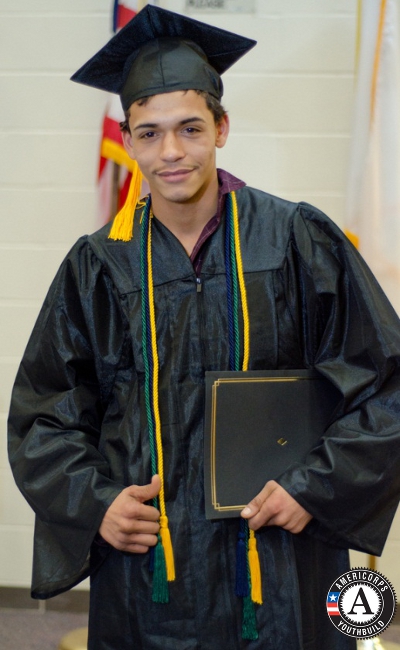By Albert Kim, Associate Director of Education, YouthBuild USA
As Brandon Menjares approached the podium for his YouthBuild Just-A-Start graduation speech, I fully expected to be blown away. If there is anything that my short time at YouthBuild has taught me, it's that YouthBuild students and graduates are resilient individuals capable of delivering their stories in both a thoughtful and inspirational way. I've heard students and graduates speak on their personal journeys, the need for greater civic engagement and service, the importance of a postsecondary education, and their desire for support as they pursue real opportunities to transform themselves and their communities. The excitement from his peers and staff promised that this occasion would be no different.
What happened next absolutely floored me.
As he spoke, it was clear that Brandon intended to take us on a journey. Not a journey focusing on his life in and out of high school, on and off the streets, or even to and through YouthBuild, but his journey of transformation. And it was a journey that would take us through a cave, Plato's cave.
It would be easy to assume that my amazement came from his very use of Plato's allegory. It was at the very least unexpected and as someone who once studied and taught philosophy in college, I could appreciate both the reference and his analysis of it. But that is only partially the truth. What I was most amazed by was Brandon's personal connection to the allegory and how, in a few short minutes, he managed to frame what I believed to be most important about both the mission and value of the YouthBuild experience: turning young people away from what's perceived to be "real" to what's actually REAL.

A few months shy of my 10th birthday, I had already been deprived of my then lifelong dream of becoming a marine biologist. Growing up in California, I had a healthy appreciation of the ocean and all things related. I spent hours at the aquarium, devoured all the books and encyclopedia articles I could get my hands on, and fantasized about being the next great oceanic explorer. That is, until I spent the entirety of my first whale watching experience bent over the side of the boat adding my lunch to the marine ecosystem. After several boat trips confirmed that my first experience was in fact not a fluke, my dream of being the next Jacques Cousteau was gone.
While my inability to stand steadily on the deck of that ship was REAL, any subsequent feelings of failure or beliefs about my ability to succeed in life would not have been. Yet, as Brandon described it, many of our young people had been denied the opportunity and ability to differentiate between the two. How many of us remember a very REAL struggle, like understanding algebra, being followed by discouraging words from a teacher that made that struggle into a lifelong deficit?
In middle school, I struggled with a unit in my Algebra II class. Like my whale watching experience, my struggles made me unsteady and sick. Yet unlike that experience, my struggles in that class were accompanied by repeated messages from my math teacher, "You aren't good at math." Despite math being one of my favorite subjects at the time, the message was internalized and my interest and confidence in the subject officially died. It wasn't until much later in life that I had the ability and courage to turn away from the shadow that was my "mathlessness" to rekindle my passion for math.
When framing the conversation for the American jobs crisis, it's important that we consider solutions that do more than train and educate young people while maintaining the larger status quo. And while we can't and shouldn't dismiss the immediate needs of the 25 million under- and unemployed American workers, to provide a solution that doesn't involve a more holistic re-engagement will have us merely perpetuating their perceived realities and not embracing their actual ones. For as long as we fail to address a young person's perceived weaknesses and deficits, we are complicit in the cordoning off of entire sectors of personal and professional opportunity. As YouthBuild graduates Gomah Wonleh , Lashon Amado and Ely Flores so aptly described, the true value of YouthBuild's career development approach was not in the initial set of skills they developed or experiences they gained from their jobs, but in the transformation and paradigm shift that occurred that empowered them to see themselves, their communities and their roles differently.
As Brandon wrapped up his speech, his message was loud and clear:
They were done with staring at shadows and were ready to see the real.
They were done with being told what they couldn't do and were ready to pursue what they could.
They were done with their time in the cave and were ready to ascend into the sunlight.
Perhaps it is time we join them.